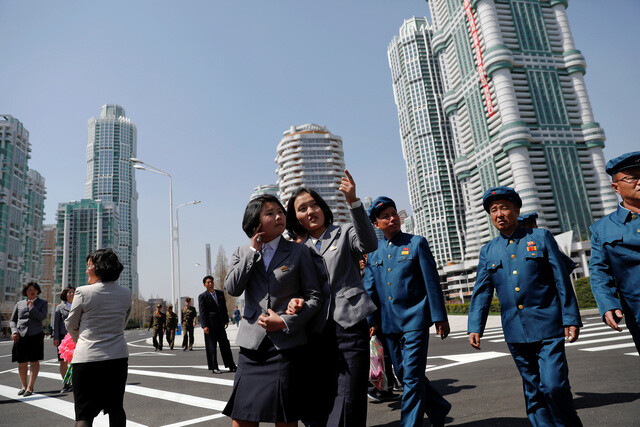hankyoreh
Links to other country sites 다른 나라 사이트 링크
Younger N. Korean defectors view nuclear weapons as “source of pride” as well as culprit behind sanctions

Nuclear weapons are “a source of pride and symbol of self-respect” to younger defectors in their 20s and 30s who spent their childhood in North Korea, but members of the same generation are concerned that people “could starve because of sanctions,” interview findings show.
The views were shared in interviews with 10 younger defectors, part of the so-called “market generation” or “’80s/‘90s generation” of people who were born or spent their childhood in North Korea around the time of the Arduous March in the 1990s.
Center for Korean Women & Politics Director Kim Eun-ju presented the findings in a report titled “Children in the City: Lifestyles and Perspectives of ’80s/’90s Generation Members in Pyongyang,” which she shared on Feb. 26 at the second Unification Social Security Seminar held by the Korea Institute for Health and Social Affairs (KIHASA). The report included responses from in-depth interviews with five male and five female North Korean defectors in their 20s and 30s who lived in major cities such as Pyongyang, Nampo, and Hoeryong or smaller cities near the border.
According to the report’s findings, nuclear weapons represent a “last bastion” to urban members of the ’80s/’90s generation, providing “the only way to guard North Korea against the US threat.” But with bank transactions blocked by sanctions and workers barred from being sent overseas, fears of possible starvation were widespread in Pyongyang, the respondents said. In particular, they said that sanctions had “done the greatest damages not to the wealthy or impoverished classes, but to members of the middle class who had invested small sums in the market.”
The economic changes appear to have been felt more acutely by members of the ’market generation, who personally witnessed the growth of markets in the wake of North Korea’s Arduous March. The so-called “market generation” born between the 1980s and 1990s experienced economic deprivation alongside their parents in their youth; as adults, they are now confronted with a market environment that is essentially no different from a capitalist society. Within the market, they have different experiences of life.
“To market generation members, it seems like the reality in North Korea is situated somewhere in between socialism and capitalism,” said Kim Eun-ju. In other words, the collapse of the North’s distribution system and the emergence of markets have led to North Koreans perceiving their society as one where survival is not possible with the capital distribution mechanism provided by the market. Around 500 official markets are currently known to exist in North Korea.
The respondents’ attitudes toward North Korean leader Kim Jong-un were reportedly quite favorable. Kim Eun-ju explained that he had instilled an image for himself among North Koreans as being a “warm, generous, and trustworthy leader,” possibly through his political approach involving anecdotes and glamorization. Young interview participants described Kim Jong-un’s “politics of fear” as being “aimed at the powerful classes and not concerned with ordinary North Koreans.” The respondents also defended the approach as “unavoidable” due to the “threat posed to Kim Jong-un’s power” by his relatives.
“[Younger people] argue that while North Korea is a dictatorship, it is not an ‘abnormal state,’” said Kim Eun-ju.
“The system of mutual monitoring among North Korean residents may appear abnormal to the outside world, but to North Korea’s it’s normal and perfect. Because of that, change from within North Korean society is impossible, and the only possible changes can come from Kim Jong-un,” she added.
By Hwang Ye-rang, staff reporter
Please direct comments or questions to [english@hani.co.kr]

Editorial・opinion
![[Column] Season 2 of special prosecutor probe may be coming to Korea soon [Column] Season 2 of special prosecutor probe may be coming to Korea soon](https://flexible.img.hani.co.kr/flexible/normal/500/300/imgdb/original/2024/0426/3317141030699447.jpg) [Column] Season 2 of special prosecutor probe may be coming to Korea soon
[Column] Season 2 of special prosecutor probe may be coming to Korea soon![[Column] Park Geun-hye déjà vu in Yoon Suk-yeol [Column] Park Geun-hye déjà vu in Yoon Suk-yeol](https://flexible.img.hani.co.kr/flexible/normal/500/300/imgdb/original/2024/0424/651713945113788.jpg) [Column] Park Geun-hye déjà vu in Yoon Suk-yeol
[Column] Park Geun-hye déjà vu in Yoon Suk-yeol- [Editorial] New weight of N. Korea’s nuclear threats makes dialogue all the more urgent
- [Guest essay] The real reason Korea’s new right wants to dub Rhee a founding father
- [Column] ‘Choson’: Is it time we start referring to N. Korea in its own terms?
- [Editorial] Japan’s rewriting of history with Korea has gone too far
- [Column] The president’s questionable capacity for dialogue
- [Column] Are chaebol firms just pizza pies for families to divvy up as they please?
- [Column] Has Korea, too, crossed the Rubicon on China?
- [Correspondent’s column] In Japan’s alliance with US, echoes of its past alliances with UK
Most viewed articles
- 1Samsung subcontractor worker commits suicide from work stress
- 2‘We must say no’: Seoul defense chief on Korean, USFK involvement in hypothetical Taiwan crisis
- 3Is Japan about to snatch control of Line messenger from Korea’s Naver?
- 4Division commander ordered troops to enter raging flood waters before Marine died, survivor says
- 5[Editorial] Korea’s surprise Q1 growth requires objective assessment, not blind fanfare
- 6No good, very bad game for Korea puts it out of Olympics for first time since 1988
- 7US overtakes China as Korea’s top export market, prompting trade sanction jitters
- 8Korea’s 1.3% growth in Q1 signals ‘textbook’ return to growth, says government
- 9N. Korean delegation’s trip to Iran shows how Pyongyang is leveraging ties with Moscow
- 10[Column] Season 2 of special prosecutor probe may be coming to Korea soon